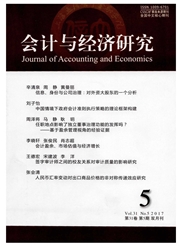

 中文摘要:
中文摘要:
文章利用拓展LLSV模型分析大股东效用函数变化,推测大股东持股比例、流通程度、股权集中度等与盈余管理幅度之间的关系。实证结果表明,随着股权流通程度的提高,大股东的盈余管理程度在降低,并且在股改后盈余管理的方向更加趋向于正向盈余管理;实施盈余操纵需要管理层的配合,在股权集中度较高的公司大股东更有能力实施盈余操纵。
 英文摘要:
英文摘要:
This paper uses the LLSV extension model to analyze changes in utility function of major shareholders,and then predicts respectively the relationships of the share ratio of major shareholders,degree of circulation,ownership concentration to the extent of earnings management. The empirical evidence supports that:(1) extent of earnings management by major shareholders decreases with the increase of degree of circulation,and major shareholders tend to adopt positive earnings management; (2) to manipulate earnings needs cooperation of the management and it's more possible to manipulate earnings in the higher degree of ownership concentration.
 同期刊论文项目
同期刊论文项目
 同项目期刊论文
同项目期刊论文
 期刊信息
期刊信息
